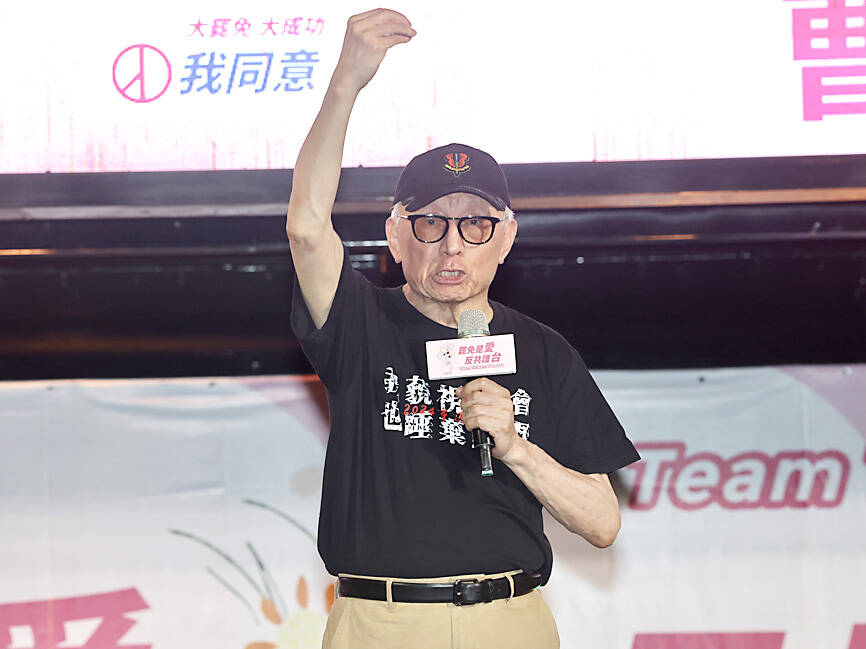Former United Microelectronics Corp (UMC) chairman Robert Tsao (曹興誠) yesterday said pro-China media are spreading disinformation to discredit him, suggesting that he was monopolizing public discourse, seeking the spotlight and attempting to form his own political faction.
Tsao dismissed the claims as efforts to sow division and provoke conflict with the Democratic Progressive Party (DPP).
Tsao, one of the leaders of citizen groups seeking the recall of Chinese Nationalist Party (KMT) lawmakers, cited recent reports from local media quoting unnamed DPP members expressing concern over the emergence of a so-called “Tsao faction” within the pan-green camp.

Photo: CNA
The reports said that Tsao was drawing excessive media attention, while sidelining other grassroots leaders — a narrative Tsao strongly rejected.
“This is clearly Taiwanese media working with communist China to spread rumors, and cause misunderstandings and disunity between citizen groups and the DPP,” Tsai said.
Tsao also dismissed speculation that he intends to leverage his growing political influence from the recall campaign to launch a presidential bid in the next election.
The KMT lawmakers facing recall are resorting to smear tactics and personal attacks, creating political turmoil in the legislature, and slashing fiscal budgets in ways that jeopardize national security and hinder government operations — all under the guidance of Beijing, he said.
Tsao also denounced the narrative advanced by the KMT and the Taiwan People’s Party (TPP) that President William Lai (賴清德) is “orchestrating the recall effort to eliminate opposition parties so he can rule as a dictator.”
“Perhaps Lai believes that direct involvement in the recall campaign is not an appropriate role for the president,” Tsao said. “But with pro-China parties constantly distorting the facts and slandering him at every turn, I think Lai is being overly modest.”
“We know the behavior of communist China, which only knows how to bully the weak and soft, and fear only those who are strong and willing to stand up to them,” he said. “They see Taiwanese as soft and easily pushed around, so they have kept bullying us.”

The Coast Guard Administration (CGA) yesterday said it had deployed patrol vessels to expel a China Coast Guard ship and a Chinese fishing boat near Pratas Island (Dongsha Island, 東沙群島) in the South China Sea. The China Coast Guard vessel was 28 nautical miles (52km) northeast of Pratas at 6:15am on Thursday, approaching the island’s restricted waters, which extend 24 nautical miles from its shoreline, the CGA’s Dongsha-Nansha Branch said in a statement. The Tainan, a 2,000-tonne cutter, was deployed by the CGA to shadow the Chinese ship, which left the area at 2:39pm on Friday, the statement said. At 6:31pm on Friday,

The Chinese People’s Liberation Army Navy’s (PLAN) third aircraft carrier, the Fujian, would pose a steep challenge to Taiwan’s ability to defend itself against a full-scale invasion, a defense expert said yesterday. Institute of National Defense and Security Research analyst Chieh Chung (揭仲) made the comment hours after the PLAN confirmed the carrier recently passed through the Taiwan Strait to conduct “scientific research tests and training missions” in the South China Sea. China has two carriers in operation — the Liaoning and the Shandong — with the Fujian undergoing sea trials. Although the PLAN needs time to train the Fujian’s air wing and

The American Institute in Taiwan (AIT) put Taiwan in danger, Ma Ying-jeou Foundation director Hsiao Hsu-tsen (蕭旭岑) said yesterday, hours after the de facto US embassy said that Beijing had misinterpreted World War II-era documents to isolate Taiwan. The AIT’s comments harmed the Republic of China’s (ROC) national interests and contradicted a part of the “six assurances” stipulating that the US would not change its official position on Taiwan’s sovereignty, Hsiao said. The “six assurances,” which were given by then-US president Ronald Reagan to Taiwan in 1982, say that Washington would not set a date for ending arm sales to Taiwan, consult

A Taiwanese academic yesterday said that Chinese Ambassador to Denmark Wang Xuefeng (王雪峰) disrespected Denmark and Japan when he earlier this year allegedly asked Japan’s embassy to make Taiwan’s representatives leave an event in Copenhagen. The Danish-language Berlingske on Sunday reported the incident in an article with the headline “The emperor’s birthday ended in drama in Copenhagen: More conflict may be on the way between Denmark and China.” It said that on Feb. 26, the Japanese embassy in Denmark held an event for Japanese Emperor Naruhito’s birthday, with about 200 guests in attendance, including representatives from Taiwan. After addressing the Japanese hosts, Wang